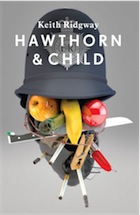I’ve been led to gather from other reviews of this book that The Uninvited Guests is very unlike Sadie Jones’ other work, including the bestselling Richard And Judy Book Club favourite The Outcast. I couldn’t tell you whether I agree because The Uninvited Guests was the first novel by Jones that I’ve read, but if this is different from her norm, then I’m almost disappointed, as I thoroughly enjoyed it and would actually love to read more in a similar vein.
Set entirely within the confines of Sterne, an Edwardian country home gradually falling into disrepair, The Uninvited Guests reads like a strange cross between I Capture The Castle, Noel Coward’s Hay Fever and An Inspector Calls with a smattering of modern-Gothic thrown in.
I must confess that it didn't quite grab me at first. The story begins with Edward Swift, the second husband of flighty matriarch Charlotte and stepfather to Clovis, Emerald and Smudge, leaving Sterne for Manchester to attempt to secure a large loan to enable the family to remain in their crumbling money-pit of an estate. In Edward's absence, Emerald is to hold a dinner party in honour of her birthday, inviting local nouveau riche farmer John Buchanan and her best childhood friends, bluestocking Patience Sutton and her amiable brother Ernest.
So far, so ordinary. The characters are slightly offbeat, the humour is gentle but fun, and the set-up fairly standard: a formerly well-off upper class family falling on financial hard times and struggling to keep an enormous house running is a relatively common premise. With the planning of the dinner party and the suggestion of a comic romance sub-plot in which Emerald is pushed into the arms of John Buchanan and his new money, one could easily be forgiven for imagining that The Uninvited Guests would develop into a witty but insubstantial comedy of manners.
But then the arrival of Patience and Ernest happens to coincide with a serious railway accident, and Sterne is commandeered by the mysterious Railway as a holding-pen for the shocked, stranded passengers. Herded into Sterne’s morning room and literally shut away by the Torrington Swifts, they are confused, hollow-eyed and grey-faced, and the longer they remain, the more intrusive and chilling their presence becomes. And when one of their number, wolfish cad Charlie Traversham-Beechers – the only passenger who claims he was travelling in First Class – insinuates himself into Emerald's dinner party, events take an even more sinister turn.
The Uninvited Guests is full of social awkwardness and brittle, slightly dysfunctional relationships that provide much of the wit and humour of the novel, yet are also touching and frequently sad. Smudge, the youngest Torrington, is dismissed with something approaching outright neglect, particularly by her mother, and there is an element of tragicomedy in her lonely 'Great Undertaking to bring her pony into her bedroom to trace her portrait on the bedroom wall. Charlotte Torrington Swift herself, desperately attached to the importance of keeping up appearances, is a self-centred drama queen, but the more we learn of her, the more we realise that she has more reason than most to want to cling to a façade of well-to-do respectability. Brisk, practical Emerald has abandoned her plans to study science while caring for her terminally ill father and is now being pushed into looking for a suitably well-off husband, and Clovis, slightly boorish and irresponsible, seems unsure of how to grow up, unable to forge a masculine role for himself in the family after his mother’s second marriage. Their insecurities, long swept under Sterne's threadbare carpets, are exposed – sometimes gradually, sometimes brutally – by Charlie, by each other and by the sheer strangeness of the situation as the increasingly demanding railway passengers become impossible to ignore.
Like another favourite novel of mine, Sarah Waters’ The Little Stranger (also deeply creepy, and also set in a shabby country manor in the early 20th century) The Uninvited Guests is not just a ghost story of sorts, but also a novel about the decline of the English upper classes. Just like the singularly unpleasant bunch in An Inspector Calls, the Torrington Swifts find themselves forced to put aside their own problems and confront the working-class horde that is, quite literally, invading their home, clamouring for warmth and sustenance, despite the family’s initial efforts to continue a lavish five-course dinner party and ignore their impromptu visitors – and the solution the Torrington Swifts find to the problem of the visitors is, in itself, surely symbolic. Moreover, it seems no accident that the book is set just two years before the First World War, an event that shattered Edwardian Britain and destroyed its innocence with brutality, shellshock and the loss of a generation.
Some reader reviews of The Uninvited Guests have criticised the style Sadie Jones has adopted for this book, which is apparently different from her usual prose and which is indeed unusually verbose for a modern novel. However, it’s pretty clear that Jones has made a deliberate decision to write in the style of the period in which the novel is set – and for me, it works beautifully, giving the novel a perfect sense of time and place without ever descending into parody, and its effectiveness reminded me of Michel Faber's use of a Victorian-influenced style to root his novel The Crimson Petal and the White firmly in the 1870s.
The Uninvited Guests doesn’t necessarily answer every question you might ask of it – at least, not explicitly – but it’s an engaging and rewarding read, cleverly executed and striking a remarkable balance between comedy and pervasive, symbolic horror. Jones has taken the brave decision of making her characters largely unlikeable at the outset, but you won’t regret sticking with them. By the time the novel reaches its conclusion, I, for one, didn’t want to leave them behind.
